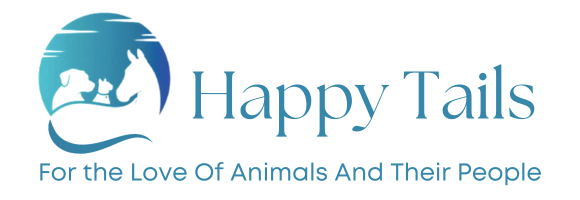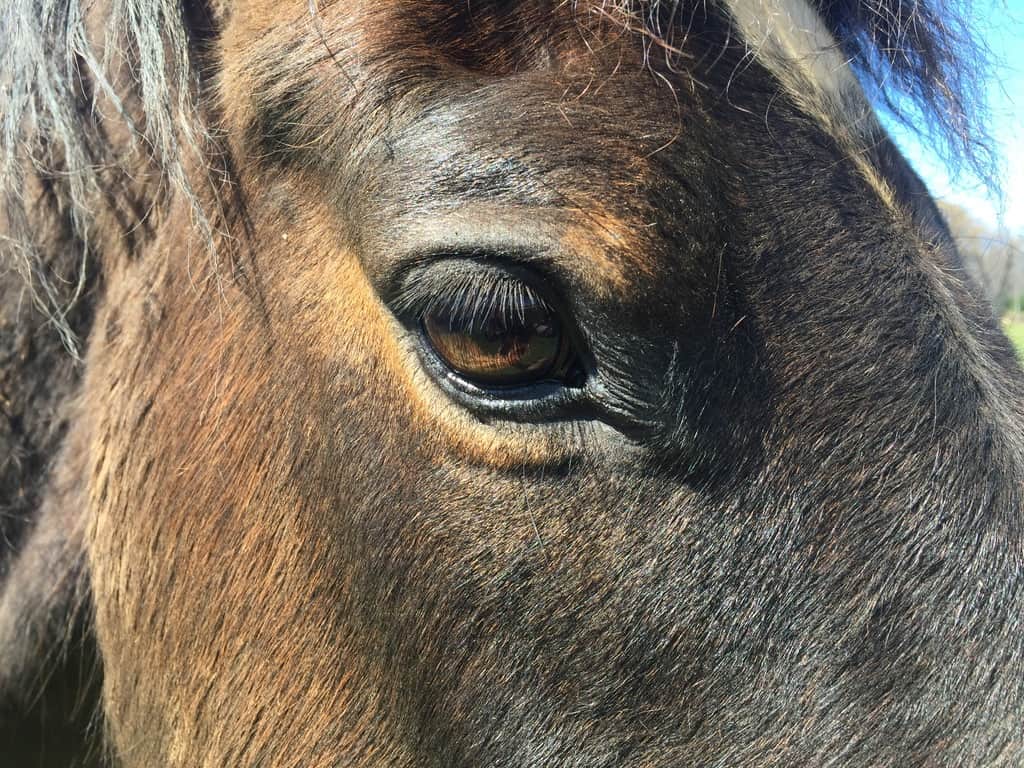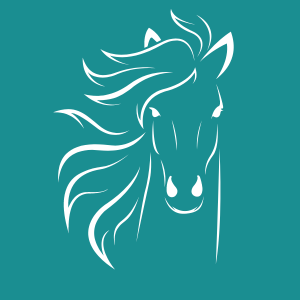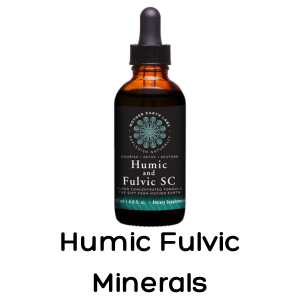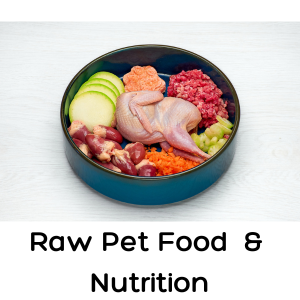Horses, to all outside appearances, generally look healthy, hence the saying, “Healthy As A Horse.” They are big strong creatures and would seem to be immune to complexities. A savvy horse owner knows just how important health is to a horse’s performance. But horses aren’t just their performance. They, like us, are susceptible to injuries, pain, toxicity, and dis-ease.
It can’t go without saying that horses (and all our animals) are also susceptible to our emotions and will mirror and reflect this aspect of ourselves. Horses are emotional beings and require being treated with tenderness and understanding.
This is certainly not to say that we should be herded around by our fellow equines. But more importantly though, that our relationship with our horses should be based on co-operation and collaboration. It’s a relationship . . . . right . . . . . .
A horse’s health is contingent upon proper nutrition within the diet, clean water, exercise, good hay, a favorable environment, and companionship. This last item, companionship is an extremely important factor in a horse’s emotional well-being.
Their counterpart, we humans, require close to the same needs to experience vibrant health and wellness. Except, of course, the hay, unless you’d like to try our amazing superfood ‘that tastes like hay’, so I’ve been told. It’s a good thing I like hay and earthy-tasting things!
On a physical level, in order to avoid health issues, this amounts to appropriate hoof health, including balanced whole body hoof trimming/shoeing, dental alignment, unique and individual saddle fit, and of course the optimal nutrition mentioned above. Every single one of these points listed above is imperative to have a healthy, happy, joyful, lively horse buddy.
Reading Your ‘Healthy As A Horse’, Horse
When it comes to natural horse health, equine professionals and horse owners alike need to be able to identify each horse’s care uniquely and individually. I’m going to share a personal example in a moment but first more on the practical principles of a horse’s life.
The Prey Nature of a Horse
The equine is a herd animal and is considered an animal of prey due to its herbivorous nature. A wild animal such as a coyote, pack of coyotes, or mountain lion can take down an adult horse in a flash. A horse showing any kind of weakness is a target.
They can also be ousted from the herd in order to preserve the whole of the herd. These are the laws of nature that sustain the species itself.
What does Preservation have to do with horse health? Everything . . . yes, everything. When your horse is ailing, whether from an injury, a negative health condition, or an emotional disharmony they aren’t necessarily completely transparent with us. Why not . . . . ? To show pain of any kind is weakness. This is not a priority in a horse’s life. They can suffer without us ever knowing until it becomes blatantly obvious. WE don’t want it to go that far.
Slow Down, Wait, and Listen
This is where we need to change. Not our horse. If we really care about our horse and want a relationship based on harmony, co-operation, and collaboration, we’ll develop the necessary skills and art of patience. We’ll also do well with every other aspect of our life as well if we let our equine partners teach us the Art.
For instance, when you go out to the pasture or barn, give yourself a few moments to breathe, center yourself, and just observe your horse. Feel the warmth of gratitude for your animals and just be with them. We don’t always need to ‘DO’ something with them, accomplish something, or achieve a goal.
Just being with them is a priceless gem. Give them the release from always having an expectation to be fulfilled. And it will do wonders for whatever discipline or riding style that you are currently entertaining.
What I Thought Wasn’t What I Thought
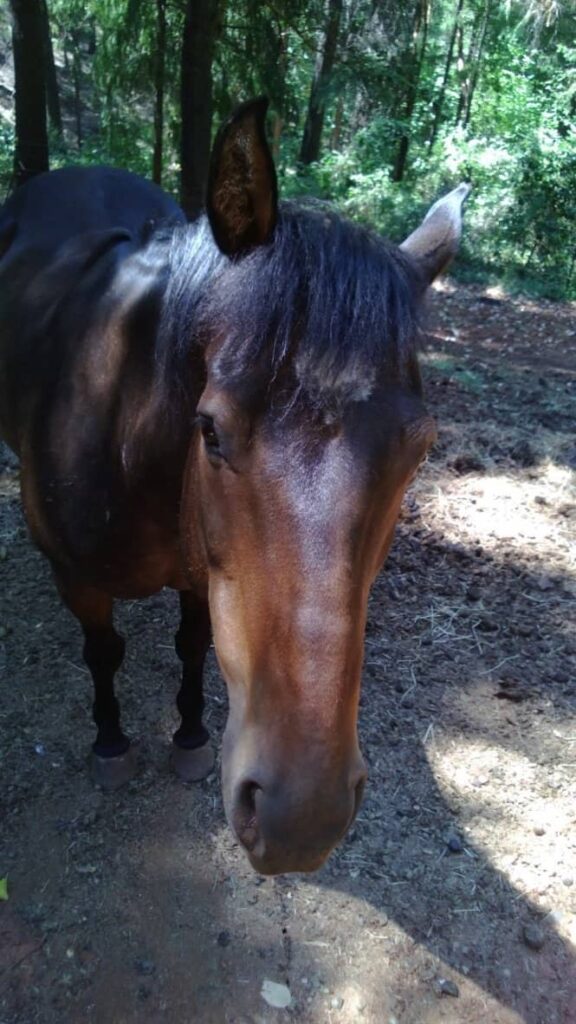
Here is a first-class example of the practical principles of the concept of taking the time to read your horse and listen. We’re all learning how to be better in life ~ all the way around. This is an example of my Healthy As A Horse, Chief. Bear with me . . . . it leads up to the precise point of this post.
Shaun, my hubby noticed Chief being a little bit lethargic and despondent for a few weeks before we found the issue. Chief and his long-term, Mustang pasture buddy have recently been blessed with a new pasture mate. Beautiful Savannah is a bright, outgoing, cheerful, Tennessee Walking mare.
She brings light wherever she finds herself. As pasture dynamics work themselves out, as they always do, we assumed there was some processing going on regarding the recent changes.
Hubby commented to me “Chief needs some time with you, probably a bodywork session would be good”. Life keeps happening every day! I didn’t make it out for the bodywork session as soon as would have been ideal.
The horses are roaming on 4 acres so we don’t always see them up close and personal except of course at feeding time and at supplement bowl-thirty mash time.
Patience And Practice
We discovered Chief was developing an infection evidenced by some discharge coming out of his left nostril and eye. A distinctive odor was beginning to appear as well. My first thought was run for the homeopathics. Which one though? Homeopathic medicine is truly one of the greatest modalities known. It’s an art and a science and it takes a moment or two to decipher which remedy or remedies are fitting for a given situation.
Patience and practice are required. Hmmmm . . . there is that word again, patience. Seems to be a theme. Anyway, I made my decision which ended up being the Silicea homeopathic remedy. A good one for infections. There ended up being a better one though. So I followed my intuitive protocol using this remedy along with some extra support including a bodywork session.
He seemed to respond right away and perk up and did well for a few days but I wasn’t getting the progressive resolution I was looking for as the days went by. The rain and cold weather hit which is not amiable for this quarter horse.
The infection seemed to gain hold and the odor and discharge increased to the point where I felt like I didn’t want to mess around with this. I’m not a fan of antibiotics unless it’s a life-threatening situation. In my years of working with animals, I’ve seen way too many animals rally up and get so much better initially only to watch the immune system tank even further with more chronic health issues.
I Forgot To Take My Own Medicine
I will note here that Chief willingly took his homeopathic medicine each and every time I came out to give it. Now, I decided to up the ante and set the homeopathics to the side for the moment. I went for the bigger, potent biocide, MMS.
As I have used it successfully in the past when the need has called for it. This too is not my favorite go-to primarily because of its biocidal nature. Any biocide basically ‘kills’ and doesn’t necessarily work harmoniously with an organism as a whole. Overall, MMS, its mechanism by nature is gentler than orthodoxy antibiotics. (Only in my personal opinion and experience).
So here I go, pasture bound in the cold rain with my 60ml syringe ready to annihilate the intruder. Chief acquiesced to my sure-fire strategy. Only as the next few days progressed did Chief not acquiesce, but adamantly would not be caught without a fight. Which was not his normal temperament, or mine.
I blamed it on our fair-weather friend, the cold rain and wind. But Chief, still with all tenacity was trying to get me to slow down, wait and listen. Ashamed to say, I didn’t get it! I forgot to take my own medicine. The unfavorable dance went on for a few days. Even with my sure-fire approach, he wasn’t better!
Pasture Bound Again
I called my friend and homeopath, told her where I was with Chief, and asked for her expertise, she asked some specific questions and suggested the homeopathic remedy, Hepar Sulph 200C. Pasture bound again only this time with my 3cc syringe full of homeopathic vibrational medicine.
It wasn’t easy to get back on Chief’s good side again and convince him I was not going to give him the biocide again, which he adamantly tried to tell me in the beginning.
Getting the Right Homeopathic Remedy
I gave him his first few doses of the Hepar Sulph and literally almost overnight the horrible odor was reduced by half and the glint in his eye was coming back. It was truly amazing. This odor was so bad and was the main reason I panicked and ran for the MMS.
There it was seriously reduced almost immediately. And within a few days, he was better than he had been in weeks. Another dramatic testimony of using the appropriate homeopathic remedy.
After dosing with the Hepar Sulph 200c twice a day for just about 2 weeks the infection has just about completely disappeared. Chief’s mood is great. And his Life Force has been boosted. I would happily do this any day rather than give him medications that eradicate the offender immediately but ultimately weaken the immune system.
I just have to add here, as evidenced by my first-hand experience above, that sometimes it takes a few tries to ‘get’ the right remedy. But when you do, the healing is truly amazing. Coming from 20+ years of experience in the holistic field, if there is one modality I wish I would have cultivated more it’s the art of homeopathy. It’s never too late though, right?
I learn more and more about homeopathy all the time and the animals are my greatest teachers.
Holistic and Homeopathic Have Different Meanings
How important it is to differentiate the mechanism of herbs, supplements, and other holistic means from homeopathy. Many, many people use the term homeopathic and holistic interchangeably and they are NOT the same thing. In general, homeopathic remedies are diluted and succussed frequencies that are taken in the form of small white pellets or dissolved in water.
Homeopathy is a holistic method by nature. But something holistic, that being a supplement or modality is not necessarily homeopathic. Homeopathics are frequency or vibration. And that’s a topic well worth exploring more, that is, understanding frequency and vibration. Another post another day.
My Personal ‘Healthy As A Horse’ Lesson
After a few days of the new remedy, Chief, finally would come to me again without me having to go get him and coerce him into taking something he clearly was telling me was not the solution. He now willingly came to me happy to take his remedy unaltered, and uncoerced.
Why didn’t I Slow down, Wait and Listen? Why didn’t I approach the pasture and Chief with an attitude of listening? Maybe because I already had an agenda of ‘what I thought I knew. Chief taught me otherwise. Having tuned into what ultimately was being demonstrated by my 1,200-pound companion, we could have reached a resolution a little sooner.
Thank goodness our animal companions are devout followers of one of the greatest spiritual tenets ever known to man, The Sermon on the Mount, and I’ve been forgiven seventy times seven, one more time.
